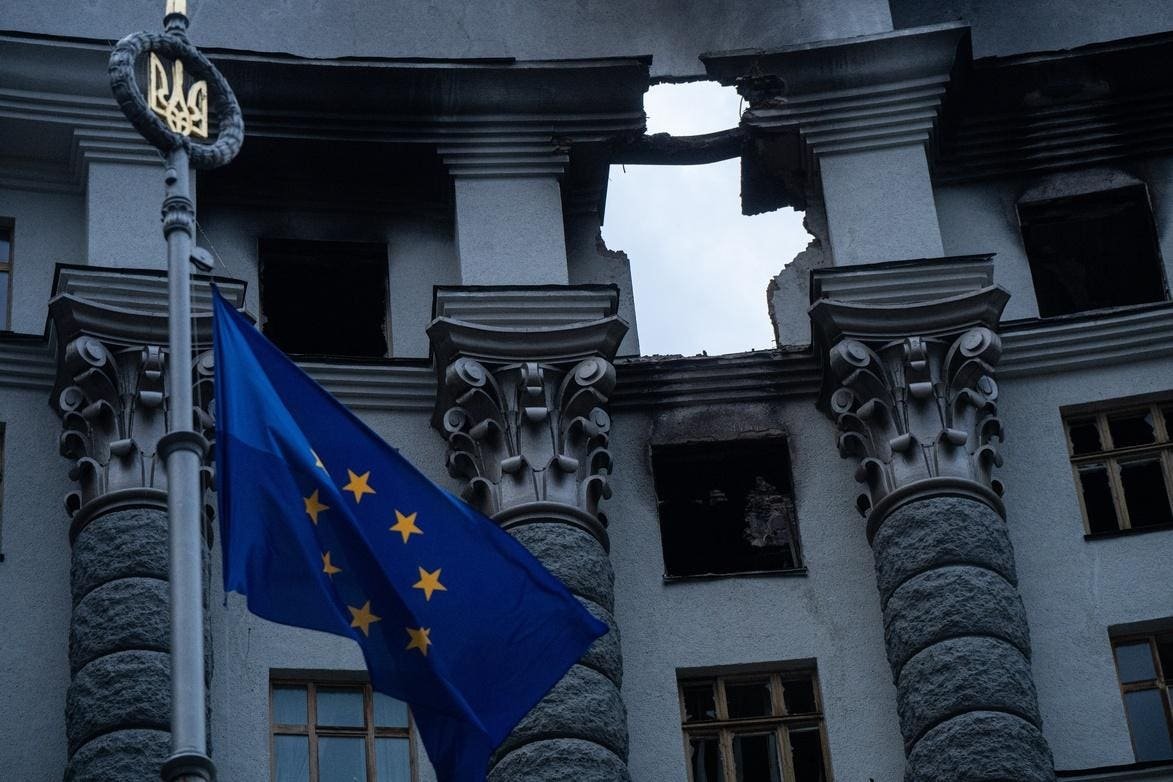KYIV, UKRAINE – SEPTEMBER 08: A view at a headquarters of Ukrainian government that was hit by a Russian “Iskander-K” cruise missile on September 7 during an overnight Russian attack in Kyiv, Ukraine, on September 8, 2025. (Photo by Danylo Antoniuk/Anadolu via Getty Images)
Anadolu via Getty Images
Dispatches from Ukraine. Day 1,294.
Russia Hits Government Building in Record Attack on Ukraine
In the early hours of Sept. 7, Russia executed the most intense aerial attack on Ukraine to date, discharging a salvo of 810 Shahed drones and decoys along with 13 missiles. Ukraine’s air defenses intercepted 747 drones and four cruise missiles, but all nine ballistic missiles penetrated defenses. The strikes hit multiple major cities across Ukraine, killing four people and injuring some 50 others.
Ukraine’s capital, Kyiv, bore the brunt of the overnight onslaught. In the government quarter, near the city’s historic center, a Russian ballistic missile struck the Cabinet of Ministers — the seat of Ukraine’s executive authority — for the first time. In the aftermath, Prime Minister Yulia Svyrydenko recorded a video message from the building’s shattered upper floors. Appearing visibly more emotional than usual, she appealed for greater international support to protect the people of Ukraine.
Meanwhile, President Volodymyr Zelenskyy renewed his calls for a stronger international response. “The world can force the Kremlin criminals to stop the killings,” he wrote on X. “All that is needed is political will.” He noted that nearly half of the fired drones were decoys designed to deplete Ukraine’s defenses. In parallel, President Zelenskyy revealed that circa 150 of the Russian drones had been taken out by inexpensive interceptor drones.
Large-scale strikes have become a standard tactic for Moscow: overwhelm Ukraine’s air defenses by launching record numbers of drones at once. Russia had previously set a record in early July with 728 projectiles in one night. So far in September, Russian forces conducted two major airstrikes of 500 airborne weapons, with 2,147 drones dispatched in total.
In addition to the large-scale strike on Sept. 7, Russian shelling killed at least 20 and wounded more than 50 civilians across Ukraine between Sept. 5 and 8. Hardest-hit was the eastern province of Donetsk with 10 civilian deaths and 20 injuries. Officials in northeastern Kharkiv oblast, or region, reported four fatalities and 14 wounded; in neighboring, central Dnipropetrovsk oblast, four individuals lost their lives, with 10 others injured. Southern Kherson province recorded two fatalities and six wounded.
New Threats of Additional Sanctions on Russia
In Washington, U.S. President Donald Trump said on Sept. 7 he is ready to increase sanctions on Moscow, but stressed that Europe must act first. When asked if he would move to the “second phase of sanctions on Russia,” he responded “yes.” Treasury Secretary Scott Bessent added that the White House is pushing Europe to act in unison. “If the U.S. and the EU do this together, we are in a race now between how long the Ukrainian military can hold up versus how long the Russian economy can hold up,” Bessent told NBC on Sept. 7.
In line with statements from other senior officials, U.S. Energy Secretary Chris Wright noted in an interview with the Financial Times that the U.S. would only escalate sanctions if European countries stopped purchasing Russian oil and gas. He emphasized that Russian fossil fuel exports are funding President Vladimir Putin’s “war machine” and urged Europe to buy American LNG and other energy products instead to meet the terms of the U.S.-EU trade deal, which calls for $750 billion in U.S. energy sales to Europe by 2028.
Washington’s more aggressive posture regarding new sanctions on the Kremlin break from the pattern of recent weeks: even after negotiations reached a dead end in August, in many cases, U.S. officials had been warm in tone toward Russia and President Putin. European officials, by contrast, have consistently emphasized the need to ratchet up sanctions pressure.
Responding to renewed unfavorable rhetoric from the U.S., the Kremlin insisted on Monday that no sanctions would ever compel Russia to alter its course on its war against Ukraine, even as the West signaled additional economic restrictions are under consideration. “No sanctions will be able to force the Russian Federation to change the consistent position that our president has repeatedly spoken about,” Kremlin spokesperson Dmitry Peskov said on Sept. 8.
Peskov also dismissed Western penalties as “absolutely useless in terms of exerting pressure on Russia,” while emphasizing that Moscow prefers to pursue its objectives through political and diplomatic channels, a path blocked, in its view, by Europe and Kyiv.
By Danylo Nosov, Karina L. Tahiliani

